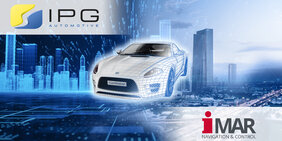IPG Automotive and iMAR Navigation combine their expertise in simulation and real-world vehicle testing to provide a powerful, holistic toolchain for scenario-based testing. The cooperation aims at saving costs and time in vehicle development and homologation processes.
Vehicle testing in the field of automated driving is becoming more and more complex: The number of test cases increases continuously and test requirements are shifting from basic single-object tests to scenario-based testing with multiple interacting participants. This situation is also the reason for standardization associations and legislators to publish guidelines to merge simulation and real-world testing and to apply an automated toolchain that is able to process the immense workload and to provide a smooth transition from simulation to real world testing.
iMAR Navigation, a pioneer of real-world scenario-based testing applications, and IPG Automotive, a leading supplier of innovative simulation solutions for vehicle development, identified the missing interface between simulation and testing on the proving ground. To close the gap, they jointly developed a holistic toolchain combining both test approaches. It enables customers to optimize their test runs by reducing errors, making optimal use of the proving ground and saving costs and time.
The toolchain encompasses scenario planning and test runs with varying parameters of any NCAP test as well as advanced scenarios in IPG Automotive’s simulation software CarMaker. Configured scenarios and test runs are transferred directly to the iARGUS-CMD software of iMAR’s proving ground control center. This software manages the real-time control of all dynamic and infrastructure objects on the track, such as vehicles under test, traffic simulation vehicles, soft crash targets, driving robots, traffic lights or barriers.
The exchange of the scenario description between both parties is based on iSCAML – iMAR’s Scenario Advanced Meta Language – that is to become part of the future ISO 22133 standard. In addition, there is also an OpenX to iSCAML converter included in the toolchain, allowing for import of OpenScenario files. For test reporting, the joint toolchain also provides standardized interfaces to transfer test data into any data analysis software after test execution and to feed data back into simulation and/or control center software.
With this new toolchain, IPG Automotive and iMAR Navigation offer users the possibility to prepare and carry out vehicle tests much more efficiently, validate simulation results and being compliant to current standardizations like AFGBV, ISO 22133 or ASAM.
